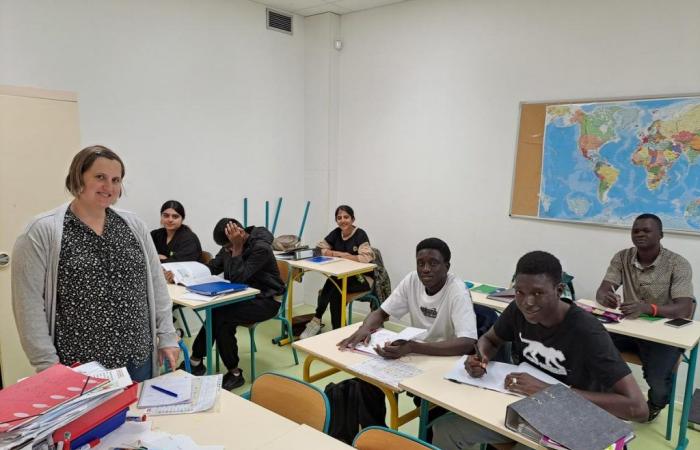
En 2023, in France, 19,370 unaccompanied minors were entrusted to child welfare. Young people who need to be integrated and trained. Hence the launch by National Education, in January 2024, of an experiment in five establishments in Gironde of an educational unit for arriving allophone students with no or little prior schooling (UPE2A-NSA). Among them, the Henri-Brulle vocational high school, in Libourne, “the only one outside of Bordeaux”, underlines Nicolas Bonnet, the principal. A conclusive test since it has been renewed. For this 2024-2025 school year, the Gustave-Eiffel (Bordeaux), Les Menuts (Bordeaux), Charles-Péguy (Eysines), Émile-Combes (Bègles) and therefore Henri-Brulle high schools have this unit dedicated to these 15-17 years old who need time to adapt to master the basics of French, maths and, more generally, general culture.
Catching up
When Nicolas Bonnet was asked, he did not hesitate. “If we want these young people to be able to integrate, we must give them the basics and introduce them to professions for which there is demand,” he believes. Carpentry/carpentry, customer relations, plaster and insulation trades… Henri-Brulle’s training courses are diverse but, before joining one, here or elsewhere, the primary goal is to catch up.
“We had 15 students last year, eight this year. Most come from sub-Saharan Africa and therefore understand French even if they do not master the written word. We are therefore bringing them up to speed with the aim that, in two or three months, they will be included in our various workshops, as well as internships in companies,” indicates the head of the establishment. A unit accessible for one year for hosted students, with entries and exits throughout the year towards an internship or “classic” training.
Upsetting life journeys
In Henri-Brulle, the system is coordinated by Mathilde Sabourin, a graduate in French as a foreign language. In front of her, students with sometimes overwhelming life stories. “Some left alone, others with family, sometimes lost on the way,” says Nicolas Bonnet. Which induces a necessary adaptation. “You have to be able to identify the student and do things according to their needs. But they are motivated,” says the professor.
“Some left alone, others with family sometimes lost on the way”
Some have already worked in the fields or elsewhere. Today, they live either in a home or with a foster family. Oussmani, almost 16 years old, arrived in France in 2023. “I want to learn French,” confides the man who hopes to work in carpentry/carpentry. At the start of the year, discussions are still laborious but, fortunately, progress is often rapid. “The goal is for them to be in school at least until they turn 18, if only to have papers. It’s a real integration issue for them,” explains Mathilde Sabourin. Indeed, without a diploma or a job, this will greatly complicate their request to stay in France. Of the 15 last year, five have already obtained a CAP: in electricity, hotel and catering and even in cooking.





